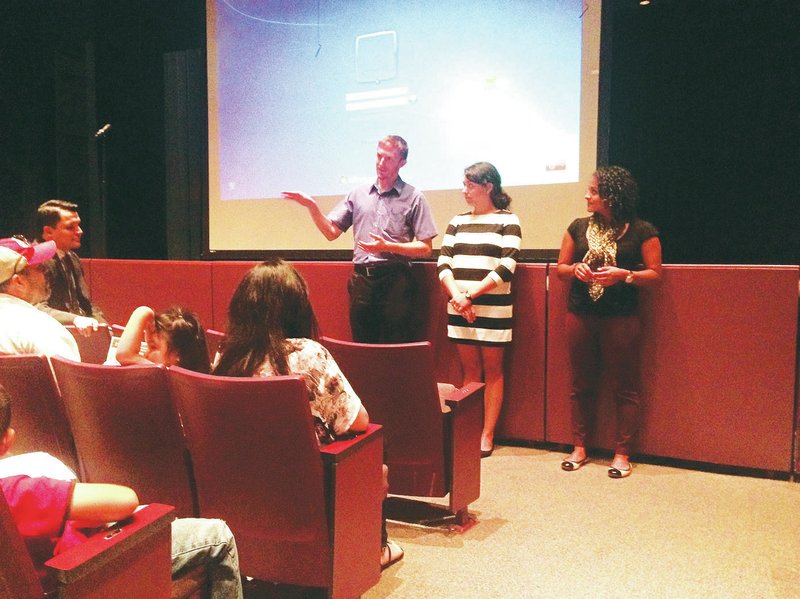SPRINGDALE -- Florencia Perez attended a meeting last week about college opportunities. Her 12-year-old daughter, Melissa Alvarado, translated for her.
Perez, who said she's learning English from her children, said it's important to have information for immigrants and non-English speakers.The Cisneros Center for New Americans, which recently opened in Springdale, is working to help immigrants with that need.
Fast Fascts
Arkansas Immigrants
• Half of Latino immigrants and two-thirds of immigrants who aren’t Latino own their homes.
• Immigrants made up 5 percent of the state’s population and 13 percent of the country’s population in 2010.
• There are heavy concentrations of immigrants in the urban areas of Northwest Arkansas and Little Rock.
• Arkansas had the fourth fastest growth rate of immigrants in the U.S. in the 1990s and from 2000 to 2010.
• Of the children of immigrants in the state, 82 percent were born in the U.S.
• More than half of the state’s immigrants have been in the country for more than 10 years.
Source: The Winthrop Rockefeller Foundation and the Migration Policy Institute
By The Numbers (w/logo)
Arkansas’ Foreign-Born
• 132,800: Foreign-born population in 2010.
• 72,900: Foreign-born population in 2000.
• 25,300: Foreign-born population in 1990.
Source: Winthrop Rockefeller Foundation and the Migration Policy Institute, January 2013
At A Glance (w/logo)
Immigrant Integration Steps
• Education
• Language, civic knowledge
• Community engagement, commitment
• Health, family well-being
• Financial capability
Source: Carrie Wolk, program coordinator for the Cisneros Center for New Americans
At A Glance (w/logo)
Cisneros Center
The Cisneros Center was established in San Antonio by Henry Cisneros, former San Antonio mayor and secretary of Housing and Urban Development for President Bill Clinton. It’s a nonpartisan, nonprofit group “seeking to achieve measurable social, economic and educational advancement in the lives of Latinos and immigrants seeking the promise of the American Dream.”
Source: cisneroscenter.org
The center's goal is to increase immigrant access to information and organizations in the community, said Jacob Perry, a fellow with the center. The center was created in Texas a little over a year ago and established its first regional office at The Jones Center.
The three people working in Springdale are creating a system to provide immigrants with the information they need, Perry said. They don't know yet what form the system will take, but it could be a referral system, or an online database of organizations.
Melissa, 12, said the information her school provides in Spanish is helpful to her mother. The possible online database could be in multiple languages to help people such as Perez who don't speak English, or aren't fluent, Perry said.
The college readiness event Perez attended was hosted by the U.S. Hispanic Leadership Institute. The center also has a goal of helping organizations like the institute by connecting them with others which provide services, said Carrie Wolk, program coordinator.
Integration can happen faster in communities where immigrants have access to information they need, Wolk said. Immigrants can contribute as much to society as people from families that have been in the U.S. for many generations. Immigrants can bring new perspectives to communities, and new methods for solving problems.
"They have a lot to offer," she said.
Integration also has an economic impact, Perry said. For every dollar the state spends for public services, such as education, on an immigrant, that individual contributes $7 to the state's economy.
People tend to contribute more to the economy if they are educated, said Elizabeth Young, director of the Immigration Clinic at the University of Arkansas School of Law. Some Northwest Arkansas organizations have services to teach immigrants about career and educational opportunities, such as college.
The number of immigrants in the country is growing, Wolk said. Officials expect 80 percent of the population growth in the U.S. from now until 2050 to be immigrants and their children.
Center officials were looking for specific attributes for a pilot region when they chose Northwest Arkansas, Wolk said. They wanted an area with an immigrant community that emerged and grew over the past 20 years, that has the need for more support and that can create change.
"Twenty years is very fast," she said.
Northwest Arkansas is a good area for the center, because there are already services in place to help immigrants, Young said. What's missing is a way for the organizations to be cohesive and communicate with each other effectively.
"I'm excited for this to be the glue," she said.
Young said she is also on the board for the Ozark Literacy Council, which helps adult immigrants learn to read and write in English, and how to be financially literate. Immigrants have many needs other than learning English, and better communication between organizations could help officials more easily address those needs.
The fellows will work with the center until June 2015, when a new group of fellows will start work, Wolk said. The fellowships last one year, and the regional office will be in the area for three to five years. The office, however, isn't open to the public.
Jessica Boyd, also a fellow with the center, said she hasn't been in the office much lately.
"We've been meeting with a lot of people," she said.
The fellows met with leaders in the Latino and Marshallese communities as well as officials from OneCommunity, Credit Counseling of Arkansas, NorthWest Arkansas Community College and the University of Arkansas, Perry said.
NW News on 08/31/2014
